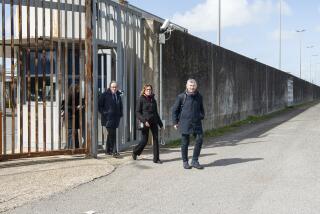COLUMN LEFT/ GARY E. RUBIN : What ‘Haven’ Can Be Behind Barbed Wire? : U.S. law allows Haitians refuge here; keeping them offshore is cruel and unnecessarily costly.
- Share via
As a Jew, I am outraged by the decision to warehouse Haitian asylum-seekers in what amounts to detention camps, as in Guantanamo. As a professional immigration-policy analyst, I believe that my outrage has a solid foundation in an objective assessment of the camp strategy.
When I was in Haiti in June, 1990, I met people who had been jailed, beaten and intimidated by the military. This fear has increased dramatically since the coup that deposed the elected government.
We must not make the mistake of believing that what is being offered the Haitians at the U.S. Navy base in Guantanamo Bay, Cuba, or any other camp, resembles in any way a welcome safe haven from persecution in Haiti.
The Guantanamo inmates are confined to a limited area demarcated by barbed wire. They live under military auspices. Their housing conditions are, at best, primitive. They have no productive work to do and have become, in the prime of their lives, idle wards of a not very generous state.
At the same time, they have close relatives in Haiti who are subject to the random violence of a military out of control, but they have little means of communicating with their loved ones or learning their fate.
Worst of all, they fled for freedom and instead were confined by U.S. authorities in what amounts to detention.
My Jewish roots cringe at the notion of putting people who have risked their lives for freedom into confinement behind barbed wire. For me, camps mean loss of life’s most precious values, not safety. Recent refugees trying to flee Vietnam and Cambodia must feel the same.
Among the policy problems the United States habitually faces is lack of an institutional memory. Detention has never worked as a solution for asylum-seekers. We tried it as a response to displaced persons in Europe after World War II, to Indochinese refugees arriving here in the late 1970s and to Caribbean asylum-seekers who reached Florida in the ‘80s. In each case, camps were established; in each case, the result was the same: Frustration produced by anxiety and idleness led to mass alienation and even violence. We can expect the same in Guantanamo if we don’t remember the mistakes of our past.
There is another huge problem with the camp plan in Guantanamo. Authoritative sources say that it will cost $2 million a day. At a time when our government argues that we cannot afford to assist thousands of people we officially recognize as refugees--at a time, indeed, when money is said to be lacking for feeding hungry children, or giving them health care, or providing shelter for the homeless--the government can find $2 million a day to warehouse Haitians in a detention camp. This is a policy doomed to fail.
Some advocates will try to improve the conditions in Guantanamo. As long as people are there, we should help them in any way we can. But we should not be fooled: There is no such thing as a humane detention policy.
Administration officials have claimed that the only alternatives to Guantanamo are forced repatriation to Haiti or, if we admit asylum-seekers to the United States, the chaos of another Mariel boatlift. They are wrong. There are more humane and less costly solutions to this problem.
Mariel produced chaos in 1980 because Cubans arrived outside the law in a totally unplanned fashion. There was no legal or institutional structure to cope with their sudden presence in the United States.
The situation today is much different. The immigration reform law of 1990 contains a provision that grants “temporary protected status” to people whose return to their homeland would put them in danger. This status has already been granted to nationals of El Salvador, Lebanon and Liberia. We should also press other nations in our region to provide similar status to Haitians needing protection.
Moreover, temporary protected status carries with it authorization to work in the United States. Instead of spending obscene amounts of money to warehouse freedom seekers, we can allow them to use their connections in the U.S. Haitian community to find work and support themselves.
No one is asking for a permanent grant of asylum for Haitian boat people, or for huge amounts of money to be spent on them. They are victims of an illegal military seizure of power that is terrorizing their country. The United States and the OAS are trying assiduously to restore Haiti’s legitimate elected government. Haitians need protection until these diplomatic maneuvers run their course. Their protected status need last only until freedom returns to their homeland.
Let us give Haitians temporary haven in our country, and let Guantanamo once again become a military base protecting liberty, not a prison snuffing out freedom.
More to Read
Sign up for Essential California
The most important California stories and recommendations in your inbox every morning.
You may occasionally receive promotional content from the Los Angeles Times.










